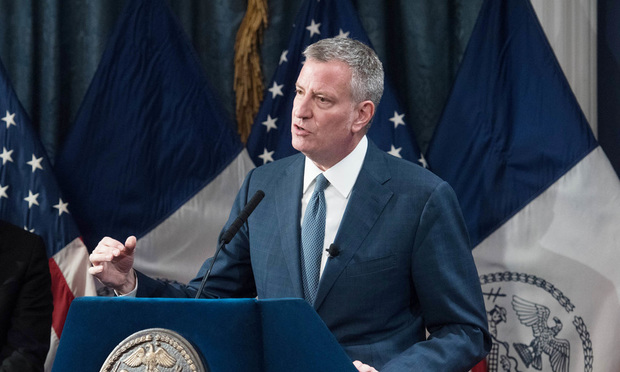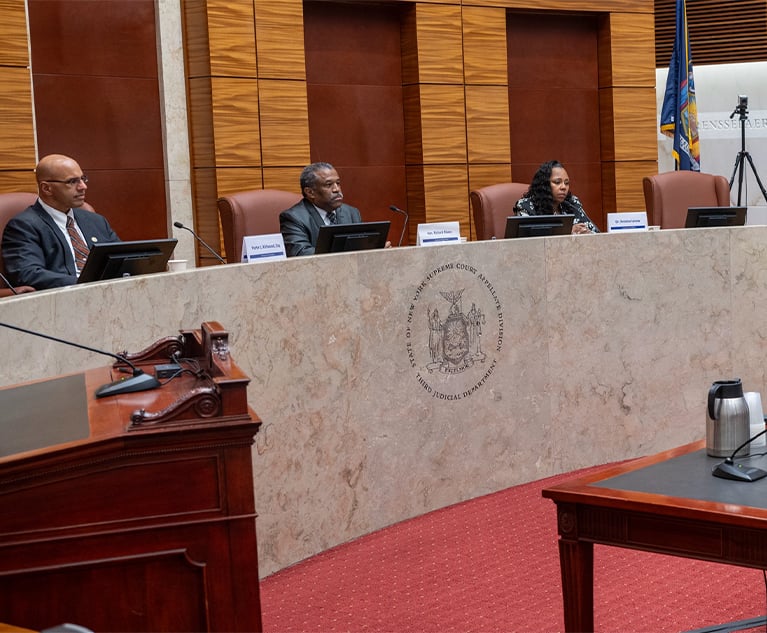Judge Says Bench Vacancies in NYC Spoil Efforts to Reduce Case Backlogs
The New York City Civil Court currently has nine vacancies.
January 02, 2019 at 04:17 PM
4 minute read
 New York City Mayor Bill de Blasio. Photo: Michael Appleton/Mayoral Photography Office
New York City Mayor Bill de Blasio. Photo: Michael Appleton/Mayoral Photography Office
The new year begins with nine vacant judicial seats in New York City Civil Court waiting to be filled by Mayor Bill de Blasio, a shortage that court officials and a Queens lawmaker said will frustrate efforts to reduce case backlogs.
In a letter sent last month to de Blasio's office, Chief Judge Janet DiFiore said it's a priority for the court system to reduce the number of cases involving inmates at the jail facility on Rikers Island, a goal de Blasio supports. Delays in filling the vacancies “frustrate our efforts and make our mutually shared goals much more difficult to achieve,” DiFiore said.
“If the vacancies are not filled on time, courtrooms throughout the city will be closed, and litigants cases will not be heard,” DiFiore said.
The mayor's office is responsible for making interim appointments to the Civil Court. The interim appointees serve terms of up to one year and can be assigned to the city's criminal and family courts.
The vacancies are also a matter of concern for City Councilman Rory Lancman of Queens, who chairs the Committee on the Justice System and who has taken de Blasio to task in the past for delays in getting judges appointed in the city's courts.
“It's deja vu all over again,” Lancman said. “Every year, like clockwork, there are judicial vacancies that need to be filled.”
In a Dec. 31 letter to Lancman, Alexis Blane, first deputy counsel to the mayor, said de Blasio picked six attorneys for interim appointments to the Civil Court and that his picks are being vetted by the New York City Bar Association. The remaining vacancies will be addressed in the coming weeks, Blane wrote.
Jane Meyer, a spokeswoman for de Blasio's office, said that the vacancies will be filled “well within the permitted timeframe.”
“Every New Yorker deserves access to a fair and equitable justice system and the choice of qualified judges is essential to maintaining its integrity,” Meyer said.
In 2017, when Lancman also took the mayor's office to task for vacancies in the Civil Court, counsel for de Blasio's office argued that it is difficult to find qualified attorneys in the city who are willing to take a year out of their professional lives to serve on the bench.
Lancman said that in his contacts with the mayor's office over the current raft of vacancies, representatives for the office have not reprised the argument that good interim appointees are hard to find. But Lancman said he chalks up the delays by de Blasio's office as “bureaucratic indifference.”
Lawrence Marks, chief administrative judge of the Office of Court Administration, said the process is further complicated by the fact that the appointees for the remaining nine vacancies—which he called a “big number”—would also need to be vetted by the City Bar.
“We've been making great progress in eliminating case backlogs in all of our courts, but in particular the New York City Criminal Court,” Marks said. “We're very concerned that the delay in making these appointments will set us back.”
Indeed, recent data shows that, as police and prosecutors in New York City have begun to take less heavy-handed approaches to low-level crime, the number of new cases taken to the city's Criminal Court has plunged from 808,868 in 2013 to 434,045 in 2017.
But Marks said the decline does not negate the need for more judges in the city.
Read more:
Bill in State Legislature Would Allow Jury Trials for Low-Level Crimes in NYC
Risk of Deportation Mandates Jury Trial for Noncitizens, NY Court of Appeals Rules
NY Appeals Judges Say Trial Courts Should Act to Quell Appeal Waiver Challenges
This content has been archived. It is available through our partners, LexisNexis® and Bloomberg Law.
To view this content, please continue to their sites.
Not a Lexis Subscriber?
Subscribe Now
Not a Bloomberg Law Subscriber?
Subscribe Now
NOT FOR REPRINT
© 2025 ALM Global, LLC, All Rights Reserved. Request academic re-use from www.copyright.com. All other uses, submit a request to [email protected]. For more information visit Asset & Logo Licensing.
You Might Like
View All

Law Firms Expand Scope of Immigration Expertise Amid Blitz of Trump Orders
6 minute read
'Reluctant to Trust'?: NY Courts Continue to Grapple With Complexities of Jury Diversity
Trending Stories
- 1Uber Files RICO Suit Against Plaintiff-Side Firms Alleging Fraudulent Injury Claims
- 2The Law Firm Disrupted: Scrutinizing the Elephant More Than the Mouse
- 3Inherent Diminished Value Damages Unavailable to 3rd-Party Claimants, Court Says
- 4Pa. Defense Firm Sued by Client Over Ex-Eagles Player's $43.5M Med Mal Win
- 5Losses Mount at Morris Manning, but Departing Ex-Chair Stays Bullish About His Old Firm's Future
Who Got The Work
J. Brugh Lower of Gibbons has entered an appearance for industrial equipment supplier Devco Corporation in a pending trademark infringement lawsuit. The suit, accusing the defendant of selling knock-off Graco products, was filed Dec. 18 in New Jersey District Court by Rivkin Radler on behalf of Graco Inc. and Graco Minnesota. The case, assigned to U.S. District Judge Zahid N. Quraishi, is 3:24-cv-11294, Graco Inc. et al v. Devco Corporation.
Who Got The Work
Rebecca Maller-Stein and Kent A. Yalowitz of Arnold & Porter Kaye Scholer have entered their appearances for Hanaco Venture Capital and its executives, Lior Prosor and David Frankel, in a pending securities lawsuit. The action, filed on Dec. 24 in New York Southern District Court by Zell, Aron & Co. on behalf of Goldeneye Advisors, accuses the defendants of negligently and fraudulently managing the plaintiff's $1 million investment. The case, assigned to U.S. District Judge Vernon S. Broderick, is 1:24-cv-09918, Goldeneye Advisors, LLC v. Hanaco Venture Capital, Ltd. et al.
Who Got The Work
Attorneys from A&O Shearman has stepped in as defense counsel for Toronto-Dominion Bank and other defendants in a pending securities class action. The suit, filed Dec. 11 in New York Southern District Court by Bleichmar Fonti & Auld, accuses the defendants of concealing the bank's 'pervasive' deficiencies in regards to its compliance with the Bank Secrecy Act and the quality of its anti-money laundering controls. The case, assigned to U.S. District Judge Arun Subramanian, is 1:24-cv-09445, Gonzalez v. The Toronto-Dominion Bank et al.
Who Got The Work
Crown Castle International, a Pennsylvania company providing shared communications infrastructure, has turned to Luke D. Wolf of Gordon Rees Scully Mansukhani to fend off a pending breach-of-contract lawsuit. The court action, filed Nov. 25 in Michigan Eastern District Court by Hooper Hathaway PC on behalf of The Town Residences LLC, accuses Crown Castle of failing to transfer approximately $30,000 in utility payments from T-Mobile in breach of a roof-top lease and assignment agreement. The case, assigned to U.S. District Judge Susan K. Declercq, is 2:24-cv-13131, The Town Residences LLC v. T-Mobile US, Inc. et al.
Who Got The Work
Wilfred P. Coronato and Daniel M. Schwartz of McCarter & English have stepped in as defense counsel to Electrolux Home Products Inc. in a pending product liability lawsuit. The court action, filed Nov. 26 in New York Eastern District Court by Poulos Lopiccolo PC and Nagel Rice LLP on behalf of David Stern, alleges that the defendant's refrigerators’ drawers and shelving repeatedly break and fall apart within months after purchase. The case, assigned to U.S. District Judge Joan M. Azrack, is 2:24-cv-08204, Stern v. Electrolux Home Products, Inc.
Featured Firms
Law Offices of Gary Martin Hays & Associates, P.C.
(470) 294-1674
Law Offices of Mark E. Salomone
(857) 444-6468
Smith & Hassler
(713) 739-1250







